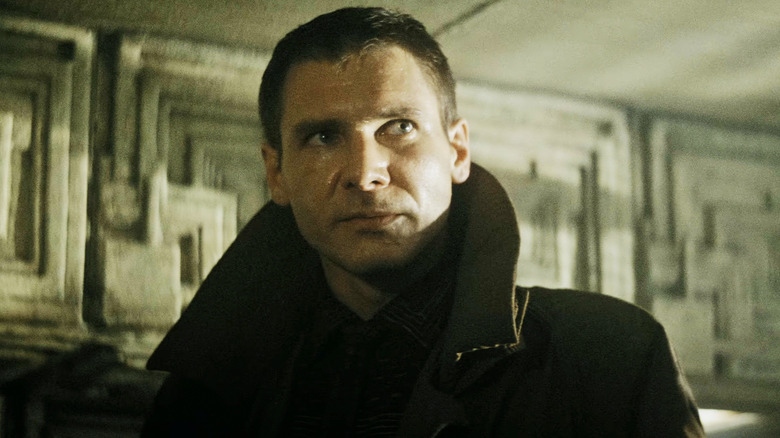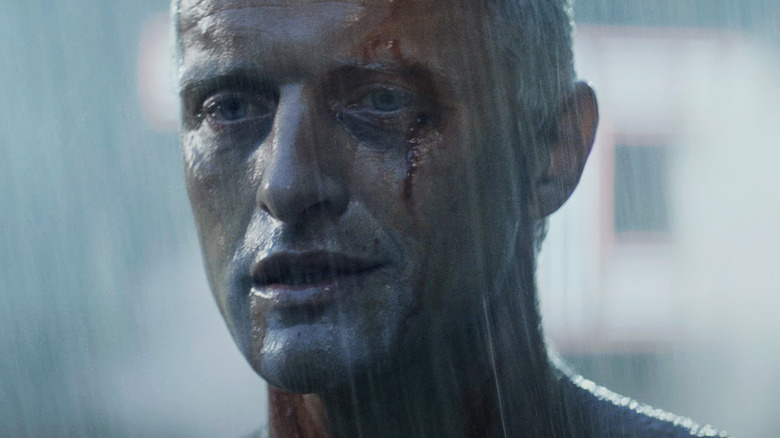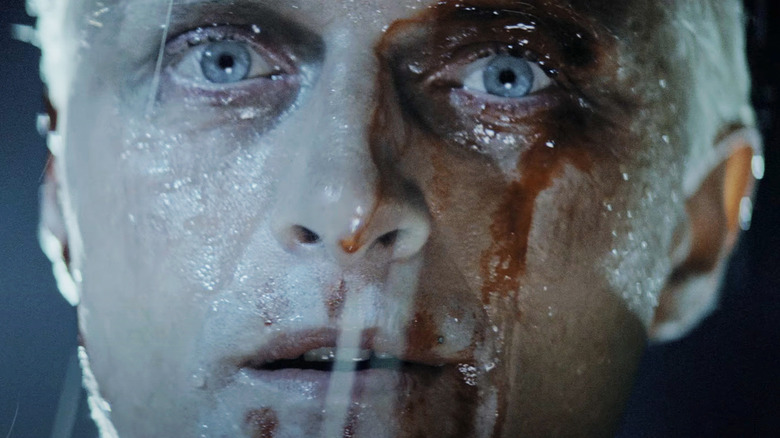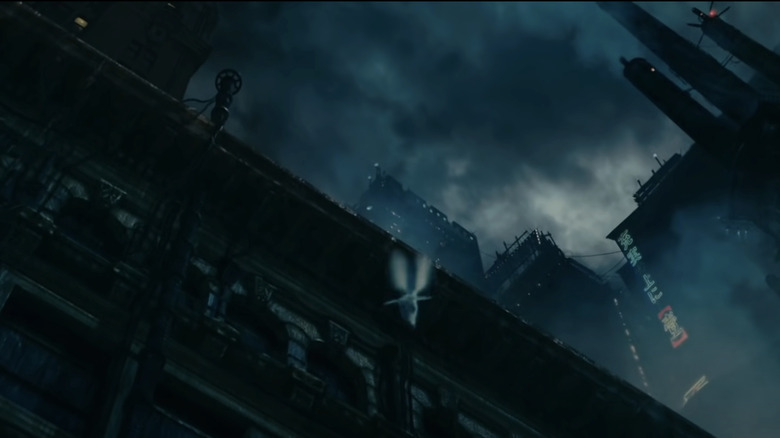A Profound Final Line In Blade Runner Was Improvised
When you think about improvisation in movies, you might initially think of comedies — the kind that come with blooper reels that are often just as good as the movie itself. We've all spent an inordinate amount of time watching and rewatching "The Office" bloopers or marveling at the unhinged absurdity of Will Ferrell and John C. Reilly's extemporaneous efforts in the "Step Brothers" blooper reel. Heck, you might even think of Chris Hemsworth improvising Thor lines.
But improv isn't, of course, just a comedic tool. Throughout the history of cinema, actors have embraced spontaneity to add an extra level of realism to their performances. Just look at Jack Nicholson and that famous "Here's Johnny" line from "The Shining." Then, there's Harrison Ford, who improvised one particular Indiana Jones moment in 1981's "Raiders of the Lost Ark," adding a touch of levity to the action-adventure classic.
But just a year later, Ford would witness a truly legendary example of how straying from the script could actually enhance a project. During the now famous closing moments of "Blade Runner," Rutger Hauer, who played rogue replicant Roy Batty, delivered one of cinema's greatest monologues (brief, though it was) while Ford looked on. As it turns out, much of these lines came from Hauer himself, who had decided to edit the scripted lines for Batty's final moments.
The tears in rain monologue
Though it failed to make a commercial impact upon its release, and star Harrison Ford still isn't too fond of "Blade Runner," Ridley Scott's 1982 effort has come to be seen as nothing short of seminal. His bleak yet strangely enchanting vision of 2019 Los Angeles — brought to life with the help of special effects pioneer Douglas Trumball and production designer Lawrence G. Paull — was undeniably captivating. But it wasn't just the incredible look of "Blade Runner" that made it a classic. The film investigates weighty themes, most notably exploring what it means to be alive and interrogating the concept of humanness itself. That very idea was brought into stark relief by Rutger Hauer's final monologue, in which the synthetically engineered android Roy Batty clearly displays an appreciation for not just being alive but for life's finer points and the poetry of existence.
After sparing Rick Deckard (Ford)'s life, Batty delivers this now-legendary speech as his synthetic body shuts down:
"I've seen things, you people wouldn't believe. Attack ships on fire off the shoulder of Orion. I've watched C-beams glitter in the dark near the Tannhauser Gate. All those moments will be lost in time like tears in rain. Time to die."
The "tears in rain" monologue somehow manages to sum up the complex themes at the heart of "Blade Runner" while remaining truly poetic and moving despite its brevity. What makes this even more impressive, however, is the fact that Hauer, who sadly passed away in 2019, came up with most of it by himself.
Rutger Hauer (sort of) improvised his big Blade Runner speech
With the "tears in rain" monologue being as famous as it is, you might have heard that Rutger Hauer improvised the speech. In reality, this isn't quite accurate. The script for "Blade Runner" was written by Hampton Fancher and David Peoples, including the final monologue. However, as Hauer told the Radio Times, "I think a lot of scripts are overwritten." As such, the actor took it upon himself to edit Roy Batty's big moment. As he revealed in a 2015 clip:
"I cut about 200 words out of the monologue. It comes out of a robot who's running out of f*****g electricity and he's also saying, 'I am dying' [...] so I said to Ridley from the beginning, 'We don't have time for a monologue.'"
Hauer went on to explain that, as well as cutting down the original speech, he came up with one original line, which just so happens to be the most memorable part: the "tears in rain" line. Rather than improvising this in the moment, however, it seems Hauer concocted these words prior to arriving on set. The "Hobo with a Shotgun" star continued:
"That wasn't improvised, it came to me at four in the morning while I was thinking, 'Goddammit I hope they don't want me to say these 300 words because I don't know them.' But Ridley said, 'Yeah, you're right. Die quickly and don't bore the audience.'"
The tears in rain line is the most memorable
This wasn't the first time Rutger Hauer spoke about his contributions to the "tears in rain" monologue, and it wouldn't be the last. Naturally, fans of "Blade Runner" have asked the man about his famous speech multiple times, as was the case in 2019 when the Radio Times spoke to the actor and he revealed that he "kept two lines [from the original script], because [he] thought they were poetic." The two lines in question were "attack ships on fire" and "C-beams glitter," which were evidently the only two elements of the scripted speech that made it to the final cut. As Hauer went on to explain:
"I thought they belonged to this character, because somewhere in his digital head he has poetry, and knows what it is. He feels it! And while his batteries are going, he comes up with the two lines."
There's no doubt these two lines are memorable, if only for the fact that they're never fully explained and therefore take on a mysterious, unknowable aura. We have no idea what a "C-beam" or the "Tannhauser Gate" is, and as such these lines simultaneously create a vague sense of awe and help enhance the feeling that the world of "Blade Runner," "expands beyond the exact image that the audience is seeing," to use Christopher Nolan's assessment of the film.
But easily the most famous line is the one added by Hauer himself, who told the Radio Times:
"For the end line I was hoping to come up with one line where Roy, because he understands he has very little time, expresses one bit of the DNA of life that he's felt, how much he liked it. Only one life."



